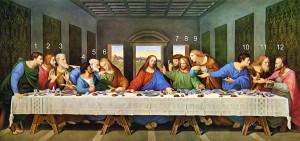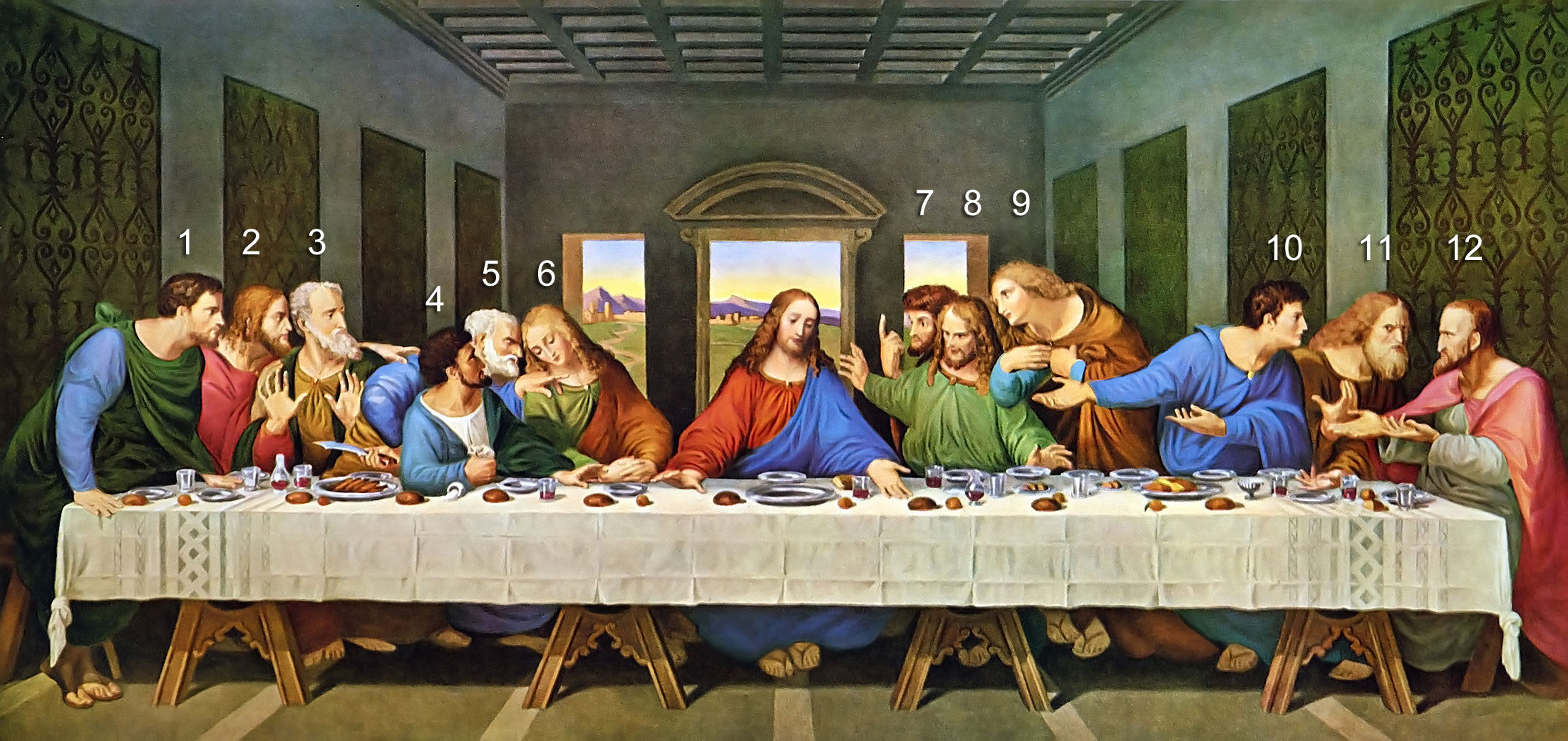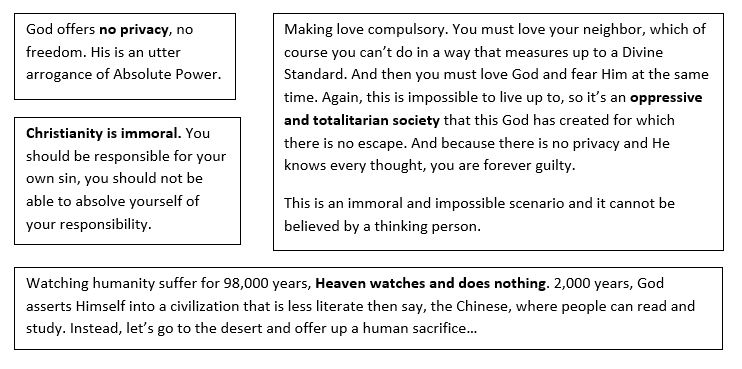 I) Intro
I) Intro
“The Last Supper” is one of the world’s most famous paintings. Leonardo da Vinci was commissioned by Lodovico Sforza, the Duke of Milan in 1495 to create, what is now considered, a legendary work of art. Today, the painting resides in the dining hall at the monastery of Santa Maria delle Grazie in Milan, Italy. At the time, however, it was Sforza’s family mausoleum.1
The painting measures 28 feet long and is 15 feet high. While it took three years to complete, it has been admired and studied for centuries.
Da Vinci chose to depict the apostles’ reaction to Christ’s statement that one of them would betray Him. He does an amazing job of portraying a number of emotional reactions which can be seen in the faces of every one of the disciples, all of whom are grouped in threes.
While there are obviously no captions on the painting to reveal which disciple is which. Notes penned by Da Vinci himself have been discovered that reveal who’s who.2 If you take a look at the restored version of Davinci’s work crafted by Giovanni Pietro Rizzoli below, you can better decipher which disciple is which by using the key to the left.

The Last Supper, ca. 1520, by Giovanni Pietro Rizzoli, called Giampietrino (active 1508-1549), after Leonardo da Vinci, oil on canvas, currently in the collection of The Royal Academy of Arts, London; an accurate, full-scale copy that was the main source for the twenty-year restoration of the original (1978-1998). It includes several lost details such as Christ’s feet and the salt cellar spilled by Judas. Giampietrino is thought to have worked closely with Leonardo when he was in Milan.
1. Bartholomew
2. James, son of Alphaeus
3. Andrew
4. Judas Iscariot (Notice how he’s clutching what appears to be a money bag. He is also tipping over the salt cellar. This may be related to the near-Eastern expression to “betray the salt” meaning to betray one’s Master. He is the only person to have his elbow on the table and his head is also horizontally the lowest of anyone in the painting.)3
5 Peter
6. John
7. Thomas
8. James the Greater
9. Philip
10. Matthew
11. Jude Thaddeus
12. Simon the Zealot
When you pull back and pop the hood on all that happened that night, it’s evident that Jesus had a lot on His plate. There wasn’t anything haphazard about all that occurred, however. Ever since God’s initial conversation with Moses, where He laid out all that needed to be done for the Passover Meal, it was this particular evening that God had in His mind where everything would be brought together in a way that pointed to His Solution for man’s sin. In a way, you could say that Jesus had a Divine script before Him that outlined everything that needed to be done in order for His death and resurrection to resonate the way that it needed to. It wasn’t just about positioning Himself as a martyr, it was doing so in a way that was consistent with the Truth and the prophecies that gave context to what was about to happen.
II) Divine Documentation
It’s nothing short of phenomenal when you really study God’s Word and see all of the symbolism and the manner in which all of these Scriptural “threads” are woven together in a way that results in something profoundly supernatural.
Ravi Zacharias is Founder and President of Ravi Zacharias International Ministries (RZIM), which celebrated its thirtieth anniversary in 2014. Dr. Zacharias has spoken all over the world for 42 years in scores of universities, notably Harvard, Dartmouth, Johns Hopkins, and Oxford University. He has addressed writers of the peace accord in South Africa, the president’s cabinet and parliament in Peru, and military officers at the Lenin Military Academy and the Center for Geopolitical Strategy in Moscow. At the invitation of the President of Nigeria, he addressed delegates at the First Annual Prayer Breakfast for African Leaders held in Mozambique.4
On a podcast entitled “Created for Significance, Part 2,” he explains how the existentialist lives for the moment, the utopian is always looking to the future and the Hebrew focuses on the events and the traditions of the past.
Given those dynamics, look at how Jesus addresses the present, past and future in the space of two sentences:
25 In the same way, after supper he took the cup, saying, “This cup is the new covenant in my blood; do this, whenever you drink it, in remembrance of me.” 26 For whenever you eat this bread and drink this cup, you proclaim the Lord’s death until he comes. (1 Cor 11:25)
- “For whenever you drink this cup” – present
- “…the Lord’s death” – past
- “…until he comes” – future
When you really study the Bible as Divine documentation, it’s amazing what you discover in terms of 66 books all culminating into a rich, cohesive whole. 66 books written over 1,500 years all pointing to one central theme: the redemption of man.
Professor M. Montiero-Williams, former Boden professor of Sanskrit, spent 42 years studying Eastern books and said in comparing them with the Bible: “Pile them, if you will on the left side of your study table; but place your own Holy Bible on the right side – all by itself, all alone – and with a wide gap between them. For,…there is a gulf between it and the so-called sacred books of the East which severs the one from the other utterly, hopelessly, and forever…a veritable gulf which cannot be bridged over by any science of religious thought.”5
III) Spiritual Propaganda – Doubting the Credibility of Scripture
Some want to doubt the credibility of Scripture. Generally speaking, the hesitancy comes from one of two ideas that the Bible was compiled by strategically collecting a series of antique texts that happened to corroborate with the spiritual propaganda they wanted to promote. The other statement that you hear fairly often is that the Bible is “filled with errors” and is thus unreliable.
A) The Old Testament
Here are some things to consider: First of all, the Old Testament is a series of carefully guarded texts, most of which come from people who had direct contact with God. Their credentials, as far as having had contact with God, coupled with the accuracy of their prophecies, make it very difficult, even for the most aggressive cynic, to doubt their integrity.
For example, the Pentateuch – the first five books of the Old Testament authored by Moses. These books document the activity of God, the Law of God and the words of God all written by someone who had direct contact with God. Joshua, Samuel, Isaiah, Jeremiah, Ezekiel, Hosea, Jonah – while they didn’t converse as frequently with God face to face, they nevertheless interacted directly with their King.
Most of the minor prophets present their content in the context of visions and oracles. In other words, God dictated to them what they were to proclaim through an experience similar to a dream. Though that may seem somewhat subjective, again, the accuracy of their visions from a historical perspective certifies their content as more than credible.
1) Dead Sea Scrolls
While the notion that the OT should be perceived as reliable due to the supernatural conversations / interactions the writers had with God may resonate as logical, that doesn’t address the possibility that the original writings may have been changed and corrupted over the centuries. The Dead Sea Scrolls was an archeological find that effectively puts those fears to rest.
The Dead Sea Scrolls are a series of some 40,000 inscribed fragments from which over 500 books have been reconstructed, Among these reconstructed books is the majority of the Old Testament.6 What made the find so significant is prior to their discovery, the oldest surviving manuscripts of the Old Testament that was available at the time was from 900 AD on. The Dead Sea Scrolls, specifically the book of Isaiah, was dated 125 AD making it over 1,000 years older than any manuscript we had previously possessed.
The number of
extant Old Testament MSS is
fairly limited. That’s not to say what we have isn’t sufficient enough to be certain that what we have in our hands today is an accurate rendering of the original text, but it’s the fact that we don’t have thousands of original copies that made the Dead Sea Scrolls such a significant find. When you’re able to take a document that was originally written in 900 A.D. and compare it to another rendering of the same text that was done 1,025 years beforehand (Dead Sea Scrolls were dated 125 B.C.) and determine that the texts are virtually identical, you have more than adequate justification to feel confident that your Bible is, in fact, the Word of God!
When comparing the manuscripts from 900 AD to the scrolls date 125 AD, the accuracy and consistency was nothing short of stunning. For example…
Of the 166 words in Isaiah 53, there are only seventeen letters in question. Ten of these letters are simply a matter of spelling, which does not affect the sense. Four more letters are minor stylistic changes, such as conjunctions. The remaining three letters comprise the word “light,” which is added in verse 11, and does not affect the meaning greatly. Furthermore, this word is supported by the LXX and IQ Is. Thus, in one chapter of 166 words, there is only one word (three letters) in question after a thousand years of transmission – and this word does not significantly change the meaning of the passage (LXX refers to the Septuagint and IQ Is is the Isaiah scroll found in the first cave at Qumran, the site where the Dead Sea Scrolls were found). 7
Given the consistency of the texts, to doubt the overall credibility of the Bible is to adopt a prospective based on a nonsensical cynicism more so than an objective analysis.
B) The New Testament – the Bibliographical Test
The New Testament is just as solid. In this case, you’re not having to reach back as far in order to examine the accuracy of the original manuscripts and the number of original MSS is significantly more.
When seeking to verify the integrity of an ancient manuscript, two things are considered:
- how many original copies do we have
- how many years have lapsed the original document and the first copy
These two dynamics combine to form what is referred to as the “Bibliographic Test” and is used to evaluate the authenticity of ancient texts.
Compared to the New Testament, Homer’s Iliad is the most credible, based on the above criteria. Take a look at how the two compare:
| Bibliographical Test – New Testament Compared to Homer’s Iliad |
| work |
when written |
earliest copy |
time span |
number of copies |
| Home (Iliad) |
900 B.C. |
400 B.C. |
500 years |
643 |
| New Testament |
40 – 100 A.D. |
125 A.D. |
25 years |
over 24,000 |
The strength of the New Testament is nothing short of substantial. When comparing one copy to another, the variations that exist are minimal. Josh McDowell, in his book “Evidence That Demands a Verdict” writes:
That textual variations do not endanger doctrine is emphatically stated by Sir Frederic Kenyon (one of the great authorities in the field of New Testament textual criticism): “One word of warning already referred to, must be emphasized in conclusion. No fundamental doctrine of the Christian faith rests on a disputed reading…
It cannot be too strongly asserted that in substance the text of the Bible is certain: Especially in this the case with the New Testament. The number of manuscripts of the New Testament, of early translations from it, and of quotations from it in the oldest writers of the Church, is so large that it is practically certain that the true reading of every doubtful passage is preserved in some one of other of these ancient authorities. This can be said of no other ancient book in the world.
Scholars are satisfied that they possess substantially the true text of the principal Greek and Roman writers whose works have come down to us, of Sophocles, of Thucydides, of Cicero, of Virgil; yet our knowledge of their writings depends on a mere handful of manuscripts, whereas the manuscripts of the New Testament are counted by hundreds, and even thousands.8
So, from the standpoint of consistency, as far the copy of the Bible that we have in our possession today being the same as what was originally dictated by God and documented by the writers He spoke through, we have an intellectually solid justification for concluding that we have an accurate copy of the original.
C) The Canon
So, we’ve got an authentic collection of antique texts. But how were those texts assembled and was there conflicting literature that was strategically omitted in order to preserve a line of thought that was more of a human campaign than it was a Divine revelation?
Bottom line: No. The “canon” of Scripture was not assembled according to a template that accommodated preferences as much as it insisted on authenticity.
1) The Old Testament
The manner in which the Old Testament was compiled is best explained by simply considering the Jewish people. As God worked in their midst through events and specific personalities, His Activity and Counsel was documented. The resulting literature was not a collection of commentaries as much as it was a record of what God said and what God did. It was not a subjective account manufactured by a panel of like minded spectators. It was an exclusive collection of individuals, each of whom had been specifically tasked to lead, speak and teach with the Authority that had been given to them by God.
Anyone that qualified as a “man of God” was not perceived as such because of their charisma or academic credentials. They were recognized as prophets because of the way in which they presented their platform under the heading of “thus saith the Lord.” You could conceivably pose as a prophet, but the consequences of falsely presenting yourself as a messenger of God were lethal (Dt 13:15). Only an obvious fulfillment of the prophecies you proclaimed could validate you as authentic (Dt 18:21-22). Hence, true prophets were easily identified and the content they disseminated as being Divinely Inspired was readily accepted.
In A.D. 70, a council of Jewish religious leaders congregated in Jamnia to discuss the canonization of Proverbs, Ecclesiastes, the Song of Solomon and the book of Esther. Some want to point to this conference as an example of a subjective human element being used to establish the content of Scripture. Thing is, these books hardly constitute the bulk of the Old Testament. Furthermore, these books weren’t disputed as much as they merited discussion for a variety of reasons – one of which is the book of Esther doesn’t mention the Name of God even once. This quartet of unique texts would be recognized as canonical and the discussions that took place were documented, thus providing evidence for future generations that not only were these books recognized as Scripture, but the majority of the Old Testament at the time of Christ and before had been established and embraced unreservedly.
2) The New Testament
The criteria used to define a particular New Testament book as worthy of being included in the Canon was similar to the attributes that were considered where the Old Testament was concerned. Namely, apostolic authority. Did the writer interact with Jesus himself, or did the writer have the approval of one who did? Given that kind of filter, the field is narrowed considerably.
The early church was staffed by the apostles. This was not due to a lack of qualified personnel or a knee jerk reaction to the departure of Jesus. This is the way Christ had set it up. For three years, Jesus had taught and led these men so they could accurately and effectively promulgate the gospel. In John 16:13, He explains how the Holy Spirit would guide them and you see that Authoritative Guidance in Acts 2:42 where it says that the early believers devoted themselves to the apostles’ teaching and to the fellowship, the breaking of bread and to prayer.
Matthew, John and Peter were both apostles, having walked with Christ during His three year ministry. Paul was commissioned as an apostle by Jesus on the road to Damascus in the ninth chapter of Acts. Between those four individuals, you have the majority of the New Testament (Matthew, John, Romans, 1-2 Corinthians, Galatians, Ephesians, Philippians, Colossians, 1-2 Thessalonians, 1-2 Timothy, Titus, Philemon, 1-2 Peter, 1-3 John and Revelation). In addition, you have the brothers of Jesus; James and Jude (the books that bear their names). These men do not promote themselves as apostles, but in 1 Cor 9:5 they are referenced alongside the apostles which implies an apostolic dynamic. The fact that Jesus appeared specifically to James (1 cor 15:7), along with the way in which Paul sought him out when he visited Jerusalem in the immediate aftermath of his conversion (Gal 1:19), makes it obvious that James possessed credentials that were recognized as apostolic (see also Gal 2:9). While there isn’t a specific biblical account of Jude having been visited by the risen Christ, 1 Cor 15:3-7 references a group of people referred to as “apostles” that are listed independently of the “Twelve.” Jude may have been a part of that group. The bottom line, however, is that both James and Jude had a unique relationship with Christ given the fact that they were all a part of the household of Joseph and Mary. They were both initially skeptical as to the Divine Identity of Christ (John 7:5), but were committed champions of His gospel after the resurrection. So while Jude is not mentioned as prominently as James, given the aforementioned realities and the content of his epistle, his book was embraced as canonical and was referenced as such by Clement of Rome in A.D. 96 and Clement of Alexandria in A.D. 200.9
Generally speaking, when the term “Apocrypha” surfaces, it’s usually in reference to the Old Testament additions that were made in 1546. In some instances, however, you’ll hear about the “New Testament Apocrypha” which applies to the literature that was being circulated between 65 and 170 A.D.. Books such as the Epistle of Pseudo-Barnabas (A.D. 70-79), the Shepherd of Hermas (A.D. 115-140) and the Acts of Paul and Thecla (A.D. 170) – these were some of the writings that concerned the Synod of Hippo. But as was the case in the past, when it came to clarifying what was biblical and what was not, there was no need to engage in lengthy, subjective discussions. Dismissing the notion that they were worthy of being considered inspired was an easy conclusion to make given their obvious lack of apostolic authority and subsequent want of Divine substance.
They Synod of Hippo in A.D. 393 was a gathering of religious authorities whose purpose was, in part, to confirm the 27 books that comprised the New Testament as canonical. There wasn’t any doubt as to which books belonged and which did not, but it was nevertheless an appropriate step to take in order to reinforce the fact that in order for a book to qualify as Scripture, it had to be penned by an apostle or someone who represented an authenticated extension of that ministry. Some had attempted to sidestep that test of authenticity thus making it needful to clearly define the books of the New Testament. The thing that’s crucial about this meeting is that nothing new was established. They simply stated what was already understood as far as what books in the New Testament qualified as Scripture.
There’s a group of texts called the Apocrypha that were added to the Old Testament in 1546.10. The books in question had been in circulation for a while, having been written over a period of centuries dating as far back as 200 years before Christ (Judith) and 100 A.D. (Baruch). But while the books, in some cases, deal with biblical themes, they are sorely lacking when compared to their Scriptural counterparts in terms of authority and accuracy. Many Catholic scholars throughout the Reformation period, as well as Luther and like minded reformers, rejected the Apocrypha. It was only at the Counter Reformation Council of Trent in 1546 that the Apocrypha was awarded canonicity by the Catholic leadership. Thing is, the Council of Trent was more about protecting the Catholic paradigm that it was upholding the Truth. The Reformation had brought to the surface inconsistencies that existed between what the pope was advocating and what Scripture proclaimed. Martin Luther lead the charge under the heading of “sola Scriptura, ” which means “Scripture alone.” He said “a simple layman armed with Scripture is greater than the mightiest pope without it.”11 Catholicism would not yield without a fight, however, and the Council of Trent was , in some ways, an attempt to reclaim the people and the reputation it had lost. But the Council appealed to tradition more so than Truth when attempting to defend its various practices. Thus, the adoption of the Apocrypha fails to resonate as an Inspired decision and is not included in the Protestant canon.
D) The Bible is Full of Errors
Skeptics will sometimes justify their refusal to take the Bible seriously by insisting that it’s “full of errors.” The reason for their skepticism, however, is not based on a careful study of Scripture. Rather, it’s more often than not, the perspective of a cynic that’s resolved to keep the Word of God at a distance in order to avoid having to perceive themselves in the light of its Truth.
That’s not to say there aren’t passages that are difficult to process and understand. The gospel writers sometimes describe the same scene differently to the point where critics insist that they contradict one another thus disqualifying the whole of Scripture as credible. But “differences” don’t necessarily equate to “contradictions” provided the elements that give each account an air of distinction don’t conflict with one another.
For example, when describing Jesus riding a donkey into Jerusalem in the context of his “triumphal entry,” Mark, Luke and John mention one donkey (Mark 11:2, Luke 28:30 and John 12:14-15). Matthew 21:2 mentions two. Take a look:
saying to them, “Go to the village ahead of you, and at once you will find a donkey tied there, with her colt by her. Untie them and bring them to me. (Matt 21:2)
Jesus wasn’t straddling two donkeys as much as it was Matthew simply mentioning what constituted a complete picture of the prophecy articulated in Zechariah 9:9:
Rejoice greatly, Daughter Zion! Shout, Daughter Jerusalem! See, your king comes to you, righteous and victorious, lowly and riding on a donkey, on a colt, the foal of a donkey. (Zec 9:9)
Chances are excellent since the foal had never been ridden before, let alone paraded around in front a large and noisy crowd, having the mother lead the foal for the sake of psychological support would’ve been a logical move. The “Encyclopedia of Bible Difficulties,” says as much:
The Zechariah passage does not actually specify that the parent donkey would figure in the triumphal entrance; it simply describes the foal as “the son of a she-ass” by way of poetic parallelism. But Matthew contributes the eyewitness observation (and quite possibly neither Mark nor Luke were eyewitnesses as Matthew was) that the mother actually preceded Jesus in that procession that took Jesus into the Holy City. Here agin, then, there is no real contradiction between the synoptic account but only added detail on the part of Matthew as on who viewed the event while it was happening.12
So, the gospel writers do not conflict with one another as much as Matthew is simply providing more detail.
You can read about more examples of “difficult to understand” passages in another “Muscular Christianity” post entitled “Ten Questions Christians Can’t Answer.” The bottom line, however, is that the Bible is not flawed. Passages that are difficult to understand do not constitute reasons to doubt the accuracy of the text as much as they are cues to pop the hood on said passage and actually study it. Look at the original languages, consider the culture of the time, ponder the audience that’s being addressed. Deploy the approach of an investigative reporter, and do so in the context of a disposition that seeks to understand what happened, as opposed to a prejudiced perspective that questions whether it happened at all.
It’s interesting to watch the amount of academic dust that gets kicked up when educated critics of the Bible unleash the full fury of their sarcasm into the marketplace. Their credentials and the dogmatic tone of their rhetoric can come across as quite compelling as they dismiss the Authority of Scripture. Yet, on the other side of the aisle stands a formidable constituency of learned individuals who, while they don’t get the same amount of press, are nevertheless just as educated and just as forceful in their defense of God’s Word and the Christian perspective.
From a layman’s standpoint, it’s not always easy to sort out the weeds from the grass, but those who defend the integrity of Scripture inevitably win out because their defense is founded on a comprehensive analysis of the facts as opposed to their adversaries whose platform is characterized by a disposition that dismisses everything save that which is consistent with their intellectual preferences. In other words, of the information that exists to either verify or explain a particular passage of Scripture, the only facts they’re willing to admit into the dialogue are those that match their definition of what’s reasonable. The resulting exchange isn’t so much an objective evaluation of a biblical text as much as it’s an attempt of the part of the skeptic to overwhelm substance with sarcasm.
Dr. Gleason Archer is the author of the “Encyclopedia of Bible Difficulties.” In the preface, he describes his inspiration for writhing the book and the experiences he draws from as he sets out to resolve the intellectual tension that some verses can create.
The problems and questions dealt with in this volume have been directed to me during the past thirty years of teaching on the graduate seminary level in the field of biblical criticism. As an undergraduate at Harvard, I was fascinated by apologetics and biblical evidences; so I labored to obtain a knowledge of the languages and cultures that have any bearing on biblical scholarship. As a classics major in college, I received training in Latin and Greek, also in French and German. At seminary I majored in Hebrew, Aramaic, and Arabic; and in post-graduate years I became involved in Syriac and Akkadian, to the extent of teaching elective courses in each of these subjects. Earlier, during my final two years of high school, I had acquired a special interest in Middle Kingdom Egyptian studies, which was furthered as I later taught courses in this field. At the Oriental Institute in Chicago, I did specialized study in Eighteenth Dynasty historical records and also studied Coptic and Sumuerian. Combined with this work in ancient languages was a full course of training at law school, after which I was admitted to the Massachusetts Bar in 1939. This gave me a thorough grounding in the field of legal evidences. Additionally, I spent three years in Beruit, Lebanon, in specialized study of modern literary Arabic. This was followed by a month in the Holy Land, where I visited most of the important archaeological sites. 13
He goes on to say that his faith has been validated and strengthened, rather than challenged and weakened as he’s tackled some of the more difficult- to-understand passages:
As I have dealt with one apparent discrepancy after another and have studied the alleged contradictions between the biblical record and the evidence of linguistics, archaeology, or science, my confidence in the trustworthiness of Scripture has been repeatedly verified and strengthened by the discovery that almost every problem in Scripture that has ever been discovered by man, from ancient times until now, has been dealt with in a completely satisfactory manner by the biblical text itself – or else by objective archaeological information.14
When you step back and consider the intellectual strength of the man who is speaking, coupled with the hands on experience he’s had with a variety of archaeological and literary artifacts, it’s virtually impossible to dismiss his content as a desperate attempt to protect a set of flawed convictions. What he brings to the table resonates as more than a mere “response.” Rather, it’s an objective platform as compelling as it is substantial – to the point where the criticisms leveled against the Word of God are quickly revealed as pathetic shadows that are effortlessly dispelled by the Light of God’s formidable Truth.
IV) Conclusion
George MacDonald was a Scottish minister as well as a prolific writer. He’s been cited as a major influence by authors such as C.S. Lewis (“The Chronicles of Narnia) and J.R. R. Tolkein (The Hobbit, The Fellowship of the Ring). He once said, “To try and explain the truth to him who loves it not, is but to give him more plentiful material for misinterpretation.”15
Some want to say that the Bible represents the quintessential example of circular reasoning. In other words, some will defend the Truth of Scripture by citing the Bible as its own witness. But Scripture is validated by history, archaeology, literature as well as the multitudes of changed lives over the centuries. It is not lacking for evidence, uniqueness, consistency or accuracy. As Professor Williams stated, there is a gulf between the Bible and every other book that’s ever been authored. It is, quite simply, the “words” of God.
The substance of Christ’s comments to His disciples at the Last Supper is but one example of the richness of Scripture. It says in 2 Timothy 3:16 that the entire Bible is God-breathed. It truly is. And the benefits that accompany obedience to God’s Word are as abundant as they are advantageous.
It’s true.
It’s God.
…and it’s only Thursday. Wait till you see what happens this weekend!
1. “The Last Supper”, Wikipedia, http://en.wikipedia.org/wiki/The_Last_Supper_(Leonardo_da_Vinci), accessed May 12, 2015
2. Ibid
3. Ibid
4. Ravi Zacharias International Ministries, http://rzim.org/about/ravi-zacharias, accessed June 2, 2015
5. “Evidence That Demands a Verdict”, Josh McDowell, Thomas Nelson Publishers, Nashville, TN, 1972, p 15
6. “The Levon Levy Dead Sea Scrolls Digital Library”, http://www.deadseascrolls.org.il/featured-scrolls, accessed June 17, 2015
7. “Evidence That Demands a Verdict”, Josh McDowell, Thomas Nelson Publishers, Nashville, TN, 1972, p 58
8. Ibid, p45
9. Although Jude had earlier rejected Jesus as Messiah (John 7:1-9), he, along with other half brothers of our Lord, was converted after Christ’s resurrection (Acts 1:14). Because of his relation to Jesus, his eyewitness knowledge of the resurrected Christ, and the content of his epistle, it was included in the Muratorian Canon (A.D. 170). The early questions about its canonicity also tend to support that it was written after 2 Peter. If Peter had quoted Jude, there would have been no question about canonicity, since Peter would thereby have given Jude apostolic confirmation. Clement of Rome (c. A.D. 96) plus Clement of Alexandria (c. A.D. 200) also alluded to the authenticity of Jude. Its diminutive size and Jude’s quotations from uninspired writings account for any misplaced questions about its canonicity. (notes on the book of Jude [“The MacArthur Study Bible”, Crossway, Wheaton, IL, 2010, p1922])
10. “Evidence That Demands a Verdict”, Josh McDowell, Thomas Nelson Publishers, Nashville, TN, 1972, p 36
11. “Sola scriptura”, “Wikipedia”, https://en.wikipedia.org/wiki/Sola_scriptura, accessed July 23, 2015
12. “Encyclopedia of Bible Difficulties”, Zondervan Publishing House, Grand Rapids, MI 1982, p334
13. Ibid, p12
14. Ibid, p15
15. George Macdonald, quoted by Ravi Zacharias
 In the USMC, “hardcharger” was a term you used to describe someone who was motivated. They were constantly striving for excellence and all the while being the kind of person you wanted to either work with or work for.
In the USMC, “hardcharger” was a term you used to describe someone who was motivated. They were constantly striving for excellence and all the while being the kind of person you wanted to either work with or work for.




















 Overcoming Adversity
Overcoming Adversity



You must be logged in to post a comment.